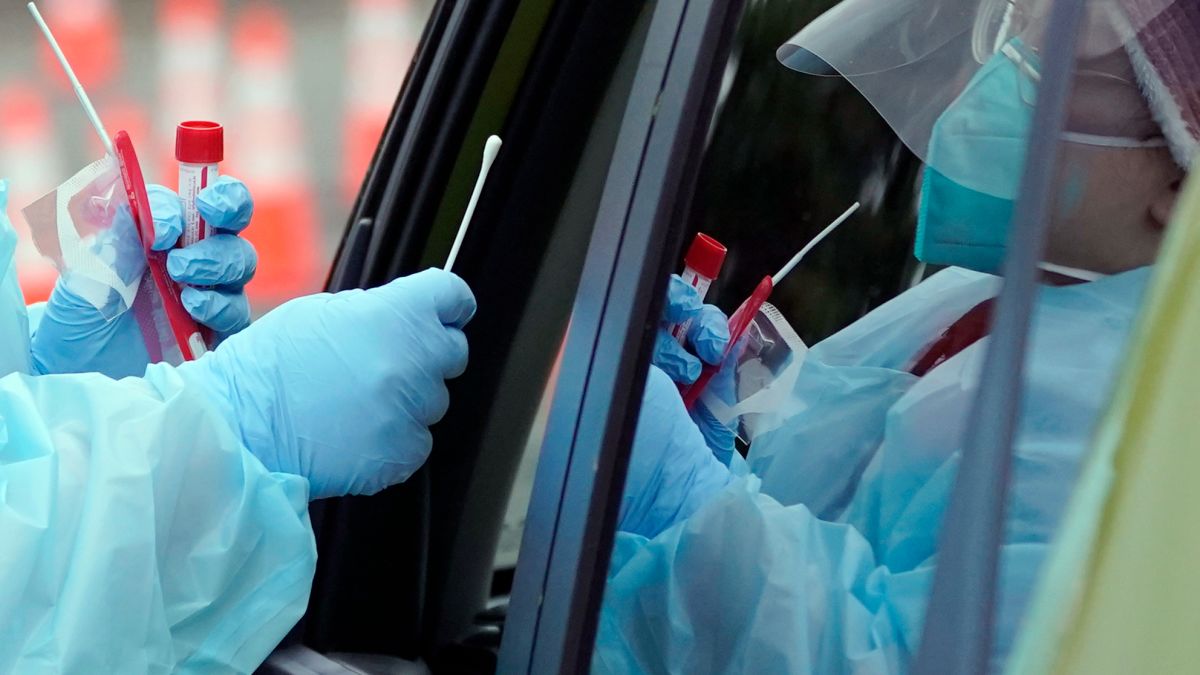Exponential increase in covid-19 cases in the world 1:12
(CNN) -
If you caught COVID-19 during the holidays - with the highly contagious omicron variant in circulation, it happened to a record number of people - you may be wondering what your next steps should be.
This is what the experts say you should know.
I tested positive, but I feel good.
Should I isolate myself?
The simple answer, said Dr. Graham Snyder, medical director of infection prevention and hospital epidemiology at the University of Pittsburgh Medical Center, is to follow the guidelines from the US Centers for Disease Control and Prevention. the CDC.
Ómicron is on the rise in Ecuador amid vaccination mandate 2:48
"Those guidelines are now based on two years of observations about what it means to be contagious," Snyder said.
That CDC guidance changed in late December.
Now it says that people who test positive for COVID-19 must isolate themselves for five days.
After that, if they have no symptoms or if their symptoms decrease (they do not have a fever for 24 hours without taking medication to reduce it), they should continue with five days of wearing a mask around others.
The CDC says that an antigen test on the fifth day is optional;
if one is positive, one must remain in isolation until the 10th.
advertising
A 'horrible' month looms in the US for covid-19, says doctor, but preventive measures will remain key
That should minimize the risk of spreading the virus.
The chance of someone being contagious after 10 days is small if their symptoms have improved and the fever is gone, experts say.
"If you've had the infection and you're feeling fine and it's been several days, it's very likely not contagious," said Dr. Myron Cohen, director of global health and infectious diseases at the UNC School of Medicine.
If you and the people around you wear masks, you are taking appropriate precautions regardless, he said.
"You don't know who in your universe is infectious," Cohen said.
Just because someone had covid five days ago does not mean they should be considered more dangerous.
"What about the guy next to you who was never tested, who is asymptomatic and has more copies than me? We should act like we assume everyone has covid."
Am I now less likely to get COVID-19 again?
The infection provides some natural immunity against the coronavirus, but it is not that simple.
"We often talk about immunity to this virus as if it were a yes or no thing. Either you are immune or you are not. But Mother Nature rarely operates like this," he said.
Immunity is a continuum.
It can change over time.
Hospitalization of children in Argentina triples 3:50
Covid-19 is not chickenpox, for example.
"In chickenpox, you won't get chickenpox again, but that's, you know, a high bar," Cohen said.
Dr. David Wohl, a professor of medicine in the Division of Infectious Diseases at the UNC School of Medicine, said your body will be able to better fight the coronavirus after an infection, but that is no guarantee that you will not contract it again. .
"I wish it could be said that once you get COVID, you never get it again. This is not that type of virus," he said.
"So we know, with the reinfection data, that you don't become immune just because you had a previous infection. There are some things that you get and never get again, but this is one of those things where, yeah, you're going to keep infecting you ".
Somehow, a person might be "safer" after contracting COVID-19 because they are less likely to become seriously ill from a subsequent infection, said Dr. Sten Vermund, dean and Anna MR Lauder Professor of Public Health at the School. Yale Medicine.
"They're also less likely to have a high viral load if they get a subsequent infection. So, in that sense, they're a little bit safer."
Up to 1 million rapid covid-19 tests expired in Florida last month, says a state official
But, experts say, don't go crazy.
Take precautions.
"I wouldn't say that no one should feel comfortable, if they have had an infection, to feel immune to reinfection or complications," Snyder said.
"It does offer some protection. I wouldn't rely on it for 100% protection."
At some point, Wohl said, this coronavirus could look more like the common cold, another coronavirus, and people will get it every few years, but it may not be that serious, and there will be easy-to-access treatments.
But those days have not yet come.
Does getting sick with one variant offer protection against another?
After any covid-19 illness, your body can usually detect the coronavirus.
"No matter which variant, your body is now better able to recognize that virus in the future. It is stronger, it is better prepared," Snyder said.
But exactly how prepared is not entirely clear.
How to test yourself for covid-19?
0:32
The delta and omicron variants were in circulation during the holidays.
Getting one of them could leave you vulnerable to the other.
"The degree of cross protection for delta and omicron is not very well understood yet," Cohen said.
"Overall, it's a complicated answer, but simplistically, the answer is that having a natural infection provides some immunity and probably provides some cross-immunity, but the extent of cross-immunity is unknown."
Last month, a small study looking at blood drawn from omicron-infected people in South Africa showed that they have strong immune responses to omicron, but also strengthened immune responses to the delta variant, the researchers reported. The study is limited and has not been peer-reviewed, and it is not certain that it was the omicron infection that enhanced immunity in the volunteers' blood, the researchers noted.
If omicron infection makes people less susceptible to delta infections, that could be a good thing, the researchers noted.
"If so, the incidence of severe covid-19 disease would be reduced and the infection could become less harmful to people and society," wrote Alex Sigal and Khadija Khan of the African Health Research Institute in Durban, South Africa, and his colleagues in their report.
Study Links Covid-19 Vaccine to Slight Change in Menstrual Cycle Length
But remember, it is not known what other variants may emerge after these, or how different they may be from delta or omicron.
What if I got sick but had not been vaccinated or received a booster dose?
Do I still need a vaccine?
Experts say yes.
With this particular coronavirus, your immune response is better with a vaccine than with a natural infection, Vermund said.
It is not entirely clear why.
Studies on covid-19 reinfection show this to be true.
Reinfection was more common in someone who had natural immunity than someone who was vaccinated.
"The chances of getting re-infected are much lower if you have been vaccinated, not even with a booster, just vaccinated, compared to if you had not been vaccinated and had been infected before," Wohl said.
Wohl points to a September study by the North Carolina Department of Health and Human Services that documented about 11,000 reinfections.
Of those, only 200 cases were in vaccinated people.
'Traumatic': this is how this man lived the 30-day quarantine in Hong Kong 2:41
"We encourage anyone who has had an infection to get vaccinated anyway because vaccination helps the body prepare by producing a stronger set of antibodies," Snyder said.
"They stick together more tightly, and especially the reinforcers are more encompassing. They can recognize the differences in the virus."
After the vaccine, any reinfection would likely lead to a much less serious illness.
What if I got a booster dose and then got COVID-19?
Can I forget to take precautions?
If you've had a reinfection, your immune system is well prepared and ready to fight the coronavirus when it finds it again, Wohl said.
Your body should be better prepared if you encounter omicron again, but there is no absolute guarantee that you will be protected if, for example, you step into a crowd without masks at a concert.
"We are in the middle of the wave of waves. This is the worst time to be out there without a mask and around other people's noses and throats," Wohl said.
Los Angeles to host Super Bowl despite growing number of covid-19 cases
Also, again, you can't be sure that the virus you come in contact with is the same variant that you contracted earlier.
"The reason that a person who has had covid and received a booster dose would still want to use common sense is because we do not yet understand what other variants there will be and how they will react to them," Cohen said.
Can I have prolonged covid after omicron?
Or could my children have MIS-C?
The omicron variant is too new for experts to know anything about its long-term effects.
How is omicron different from other variants?
This is what we know 2:50
"We don't know yet," Snyder said.
"It's too early to tell."
Research has found that vaccination dramatically reduces the risk of long-term covid symptoms. And other studies say that the most serious effects of a covid complication called multi-system inflammatory syndrome in children (MIS-C) resolve within six months.
Covid-19









